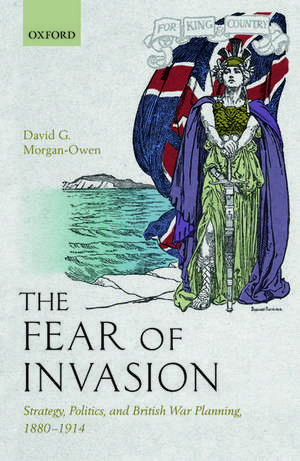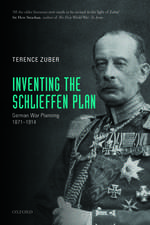The Fear of Invasion: Strategy, Politics, and British War Planning, 1880-1914
Autor David G. Morgan-Owenen Limba Engleză Hardback – 13 iul 2017
| Toate formatele și edițiile | Preț | Express |
|---|---|---|
| Paperback (1) | 245.57 lei 10-16 zile | |
| OUP OXFORD – 23 apr 2020 | 245.57 lei 10-16 zile | |
| Hardback (1) | 628.17 lei 31-37 zile | |
| OUP OXFORD – 13 iul 2017 | 628.17 lei 31-37 zile |
Preț: 628.17 lei
Preț vechi: 901.27 lei
-30% Nou
Puncte Express: 942
Preț estimativ în valută:
120.20€ • 125.83$ • 99.46£
120.20€ • 125.83$ • 99.46£
Carte tipărită la comandă
Livrare economică 26 martie-01 aprilie
Preluare comenzi: 021 569.72.76
Specificații
ISBN-13: 9780198805199
ISBN-10: 0198805195
Pagini: 264
Dimensiuni: 168 x 237 x 22 mm
Greutate: 0.55 kg
Editura: OUP OXFORD
Colecția OUP Oxford
Locul publicării:Oxford, United Kingdom
ISBN-10: 0198805195
Pagini: 264
Dimensiuni: 168 x 237 x 22 mm
Greutate: 0.55 kg
Editura: OUP OXFORD
Colecția OUP Oxford
Locul publicării:Oxford, United Kingdom
Recenzii
Morgan-Owen's outstanding book emphasises the failure of well-meaning, but ignorant, and ideologically constrained ministers to settle national strategy ... This landmark text has re-set the debate.
Morgan-Owen has brought out more clearly, and in much greater detail than previous authors, the chaotic and unmanaged interaction between the two services when they contemplated how to deter an invader.
thought provoking and puts forward a high persuasive case... Morgan-Owen's work represents a major contribution to the historiography
The Fear of Invasion is a landmark study... These are paradigm-changing conclusions.
Occasionally a book comes along that offers important new insights into a supposedly familiar subject. David G Morgan-Owen's masterly The Fear of Invasion is such a work.
an impressive debut monograph which finds a fresh approach...and establishes him as an historian to watch
this book represents a major correction to the orthodox interpretation of British naval policy presented in Arthur Marder's seminal works on the Royal Navy. It also demolishes the central arguments of the controversial 'revisionist' school of naval historians. Given the volume of scholarly attention lavished on the problem of British strategy on the eve of the First World War, this is an impressive achievement.
a brilliantly argued and impressively well-researched monograph. Morgan-Owen's book will doubtless become a key reference alongside existing works on pre-Great War British war planning, and offers important new insight into the workings of the political and military leadership who tried to decide how to pursue an offensive military policy while also defending the heart of the empire itself.
There is a wealth of detail in The Fear of Invasion, which takes the reader through a tale of Victorian and Edwardian inter-service rivalry, febrile national politics, huge defence budgets but a painful lack of readily available cash, seemingly unending overseas commitments and a global scene that was at best confusing and at worse downright dangerous. Delete the words 'Victorian and Edwardian' and the thoughtful reader could easily start to draw parallels to today. That is one of the joys of well-written history: without necessarily setting out to do so, it allows us to take stock of our own woes and, if we are lucky, start to see a way through them. Unfortunately, a century ago the conglomeration of strategy, politics and military planning throughout Europe led to catastrophic war. We must hope that the many similarities to evident to contemporary events in this book end short of full replication.
Morgan-Owen's important book reminds us of the fundamental importance of civilian political leadership to strategy making and war-planning. He offers a study of the failure of this leadership in the years leading up to World War I, and a timely lesson about the dangers of a strategy based on fear of new threats, rather than on an appreciation of one's own strengths.
This is a fundamentally new way of looking at the position of Britain in 1914. Most historians have assumed that what happened to the BEF had to happen. Morgan-Owen suggests otherwise, and his arguments will be required reading for anyone dealing with British policy on the outbreak of war. Was there an alternative to the Western Front? Did the incapacity of the navy condemn Britain to the killing fields of France and Flanders? Raising questions such as these will have a profound effect on the intellectual approach to the entire field. Few books manage such a feat. David Morgan-Owen has achieved a great deal with this first book. I look forward to his subsequent work, which might help settle some of the uncertainties he has now raised.
Morgan-Owen has brought out more clearly, and in much greater detail than previous authors, the chaotic and unmanaged interaction between the two services when they contemplated how to deter an invader.
thought provoking and puts forward a high persuasive case... Morgan-Owen's work represents a major contribution to the historiography
The Fear of Invasion is a landmark study... These are paradigm-changing conclusions.
Occasionally a book comes along that offers important new insights into a supposedly familiar subject. David G Morgan-Owen's masterly The Fear of Invasion is such a work.
an impressive debut monograph which finds a fresh approach...and establishes him as an historian to watch
this book represents a major correction to the orthodox interpretation of British naval policy presented in Arthur Marder's seminal works on the Royal Navy. It also demolishes the central arguments of the controversial 'revisionist' school of naval historians. Given the volume of scholarly attention lavished on the problem of British strategy on the eve of the First World War, this is an impressive achievement.
a brilliantly argued and impressively well-researched monograph. Morgan-Owen's book will doubtless become a key reference alongside existing works on pre-Great War British war planning, and offers important new insight into the workings of the political and military leadership who tried to decide how to pursue an offensive military policy while also defending the heart of the empire itself.
There is a wealth of detail in The Fear of Invasion, which takes the reader through a tale of Victorian and Edwardian inter-service rivalry, febrile national politics, huge defence budgets but a painful lack of readily available cash, seemingly unending overseas commitments and a global scene that was at best confusing and at worse downright dangerous. Delete the words 'Victorian and Edwardian' and the thoughtful reader could easily start to draw parallels to today. That is one of the joys of well-written history: without necessarily setting out to do so, it allows us to take stock of our own woes and, if we are lucky, start to see a way through them. Unfortunately, a century ago the conglomeration of strategy, politics and military planning throughout Europe led to catastrophic war. We must hope that the many similarities to evident to contemporary events in this book end short of full replication.
Morgan-Owen's important book reminds us of the fundamental importance of civilian political leadership to strategy making and war-planning. He offers a study of the failure of this leadership in the years leading up to World War I, and a timely lesson about the dangers of a strategy based on fear of new threats, rather than on an appreciation of one's own strengths.
This is a fundamentally new way of looking at the position of Britain in 1914. Most historians have assumed that what happened to the BEF had to happen. Morgan-Owen suggests otherwise, and his arguments will be required reading for anyone dealing with British policy on the outbreak of war. Was there an alternative to the Western Front? Did the incapacity of the navy condemn Britain to the killing fields of France and Flanders? Raising questions such as these will have a profound effect on the intellectual approach to the entire field. Few books manage such a feat. David Morgan-Owen has achieved a great deal with this first book. I look forward to his subsequent work, which might help settle some of the uncertainties he has now raised.
Notă biografică
David G. Morgan-Owen is a lecturer in Defence Studies at King's College London. He was previously a Visiting Research Fellow at the National Museum of the Royal Navy, Portsmouth, and an Associate of the Centre for Maritime Historical Studies at the University of Exeter, where he gained his PhD in 2013. Dr. Morgan-Owen has published on British strategy before and during the First World War in the English Historical Review, War in History, Journal of Strategic Studies, and the International History Review.












